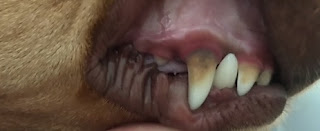Teefs - the importance of pet dental care
Why is pet dental care important?
Dogs require regular dental care to prevent gum disease from occurring. When your pet eats, their saliva, bacteria and food form together, creating plaque, a type of bacteria which produces a clear film on the dental surface. If this substance isn’t removed, plaque can build up over time, creating tartar; a brown, yellow hardened substance. A build-up of tartar can irritate your pet’s gums as it accumulates above and below the gum line, causing inflammation, redness and bad breath (gingivitis).
Bad teeth and gums can also lead to other serious problems in dogs like kidney and heart disease if left untreated.
Nellie (above) is a perfect example of a dog with bad teeth. I recently asked the vet what the difference was between my Labrador who has perfect white teeth at aged 8 and Nellie who at 3 has a build up of plaque when they both eat the same food.
I do give them bones however the bigger breed uses all her teeth to bite whereas the small breed pushes the bone to the back of her mouth and doesn't use her front teeth.
Anyway the vet said that it was a breed thing and that smaller dogs were more prevalent to dental problems than bigger dogs mainly due to the size of their mouth and in many cases overcrowding of the mouth.
The Royal Veterinary College in London recently did a study on canine dental disease and they reported the following:-
- One in every 8 dogs (12.5%) overall suffers from dental disease every year.
- Eighteen breeds showed increased risk of dental disease compared with crossbred dogs. The breeds with the highest risk included Toy Poodle (x 3.97), King Charles Spaniel (x 2.63), Greyhound (x 2.58) and Cavalier King Charles spaniel (x 2.39).
- Four breeds showed reduced risk of dental disease compared with crossbred dogs: German Shepherd Dog (x 0.25), French Bulldog (x 0.43), Staffordshire Bull Terrier (x 0.45) and Labrador Retriever (x 0.49).
- Flat-faced (brachycephalic) breeds overall had 1.25 times the risk of dental disease compared with breeds with medium-length (mesocephalic) skulls.
- Spaniel breeds overall had 1.63 times the risk of dental disease compared with non-spaniel breeds.
- Smaller dogs were at had greater risk of dental disease: dogs weighing < 10.0kg had 3.07 times the risk compared with dogs weighing 30.0 - < 40.0 kg.
- Aging was strongly associated with increased risk of dental disease, with dogs aged ≥ 12 years at 3.91 times the risk compared with dogs aged 2 to < 4.
The vet explained that the dental hygienist would perform a full scale and polish and would smooth over any fines lines and crevices to limit the return of deep routed plaque and bacteria.
In all honesty I think this really is the way to go.
Maintenance by me
After effective cleaning I would commit to cleaning her teeth a couple of times a week with a soft rubber finger brush, that coupled with bones,
I have bought these from Amazon:
I'll update you but in the meantime I want to see how effective chicken wings are for cleaning teeth.....the first picture is day 1 - 26th April 2022
A Guide to Chicken Wings for Dogs (furrypeep.blogspot.com)





Comments
Post a Comment